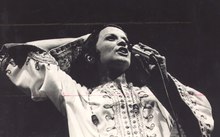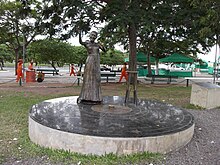Elis Regina
Elis Regina Carvalho Costa (Porto Alegre, March 17, 1945 – São Paulo, January 19, 1982), popularly known as Elis Regina, was a singer Brazilian, considered one of the greatest representatives of the musical genre known as Brazilian popular music (MPB). Her early death, at the age of 36, was due to an overdose of cocaine and alcohol, although the theory is being considered that she would have been a victim of the prevailing dictatorship. Many critics, musicians, and performers consider her one of the best singers in Brazil..
Biography
She was the daughter of Romeu Costa, a man with a silent character, and Ercy Carvalho Costa, a person with a strong character. Her career began at the age of 7, in 1952, on a local radio station, but she could not open her mouth, due to stage fright that she apparently could not overcome at the time.
Four years later, he tried his luck again and participated in the children's radio program O Clube do Gurí on Radio Farroupilha. Thus she achieved her first professional contract.
In 1959 she was hired by Rádio Gaúcha and the following year she traveled to Rio de Janeiro, where she signed her first contract with the record company Gravações Elétricas and recorded her first LP, Long live Brotolândia. With this company she made her second LP in 1962, titled & # 34; Poema de Amor & # 34;. Later, her famous promoters, Luiz Carlos Miele and the composer Ronaldo Bôscoli, saw her leave for São Paulo where her career continued to rise. In 1965 she released an LP with Jair Rodrigues, Dois na bossa , which set a national sales record. Since that same year, she has hosted, together with Jair Rodrigues, one of the most important Brazilian popular music television shows, O Fino da Bossa .
In the late 1960s and early 1970s, Regina helped popularize the work of the Tropicalia movement, recording songs by musicians such as Gilberto Gil.
The artist married Ronaldo Bôscoli from whose marriage she had her first child, João Marcelo Bôscoli Carvalho, born two years before the final separation. By then, Elis Regina had fallen in love with her pianist, César Camargo Mariano, who was married. Shortly after, they got married and had Pedro Camargo Mariano and Maria Rita Mariano, who became a very popular singer.
In a 1969 interview, he openly criticized the Brazilian government, calling it "a cabal of gorillas. Her popularity kept her out of prison, but she was eventually forced by the authorities to sing the Brazilian national anthem during the Army Olympics, which was rejected by many left-wing Brazilians.
He then toured Milan, Rome, Paris and Barcelona[citation needed] on an artistic tour, declaring that the European public needed to understand that Brazil was not just a Carnival town.
In 1974 he recorded with singer-songwriter and musician Tom Jobim the album Elis & Tom, considered by music critics as one of the best bossa nova records of all time.
Death
On January 19, 1982, at approximately ten in the morning, lawyer Samuel McDowell of Figuereido spoke with the artist on the phone and noticed her thick voice and then only silence. He called twice, but got no answer. He quickly arrived at Elis Regina's apartment and found that her younger children were playing, waiting for her to wake up. The lawyer looked for the artist's eldest son, João Marcelo, and together they forced the doors of the bedroom and found her lying on the floor. She was not breathing, her hands were cold and her body was hot. McDowell called the doctor and the ambulance, but no one came, so he took the singer in a taxi to a clinic, where she was confirmed dead.
By noon, all of São Paulo and more than half of Brazil knew of his death. A day later, the artist's corpse was put on a T-shirt with the Brazilian flag and her name instead of the slogan Order and Progress . It was later determined that Elis Regina died from an overdose of drugs, tranquilizers, and alcohol.
Some news spread that the artist's death had been ordered by the high command of the military dictatorship, still in force at that time, since the official account of her autopsy took too long to appear in the Brazilian media, and his death was the subject of speculation. To this day, it is not known exactly what happened in her house on the day of her death. Her remains rest in São Paulo in the Morumbi cemetery.
Discography
Main discography
| Year of publication | Title | Discographic |
| 1961 | Live to Brotolândia | Continental-Gravações Elétricas (Brazil) |
| 1962 | Poem of love | Continental-Gravações Elétricas (Brazil) |
| 1963 | Ellis Regina | CBS (Brazil) |
| 1963 | O bem do amor | CBS (Brazil) |
| 1965 | Samba, Eu chant assim | Philips-Companhia Brasileira de Discos |
| 1965 | 2 na bossa | Philips-Companhia Brasileira de Discos |
| 1965 | O fino do fino | Philips-Companhia Brasileira de Discos |
| 1966 | 2 na bossa Number 2 | Philips-Companhia Brasileira de Discos |
| 1966 | Elis | Philips-Companhia Brasileira de Discos |
| 1967 | 2 na bossa Number 3 | Philips-Companhia Brasileira de Discos |
| 1968 | Elis Especial | Philips-Companhia Brasileira de Discos |
| 1969 | Tabelinha: Pelé X Elis | Philips-Companhia Brasileira de Discos |
| 1969 | Elis Regina in London | Philips-Phonogram Limited (United Kingdom) |
| 1969 | Elis & Toots | Philips-Phonogram International B.V. (Hellonda) |
| 1970 | Em plena verão | Philips-Companhia Brasileira de Discos |
| 1971 | Ela | Philips-Companhia Brasileira de Discos |
| 1972 | Elis | Philips-Companhia Brasileira de Discos Phonogram |
| 1973 | Elis | Philips-Companhia Brasileira de Discos Phonogram |
| 1974 | Elis | Philips-Companhia Brasileira de Discos Phonogram |
| 1974 | Elis & Tom | Philips-Companhia Brasileira de Discos Phonogram |
| 1976 | Elis Regina Em "Falso brilhante" | Philips-Companhia Brasileira de Discos Phonogram |
| 1977 | Elis | Philips-Companhia Brasileira de Discos Phonogram |
| 1978 | Transversal do tempo | Philips-Companhia Brasileira de Discos Phonogram |
| 1979 | That's mulher. | Warner Bros-WEA Discos (Brazil) |
| 1979 | Elis Especial | Philips-Polygram Limited Discos (Brazil) |
| 1980 | Saudade do Brasil | Elektra-WEA Discos (Brazil) |
| 1980 | Elis | Emi Odeon (Brazil) |
Posthumous Discography
| Year of publication | Title | Discographic |
| 1982 | 13th Montreux Jazz Festival | Elektra-WEA Discos (Brazil) |
| 1982 | Trem blue | Som Livre-Sistema Globo de Gravações Audiovisuais (Brazil) |
| 1983 | Vento de maio | EMI Records Limited (United Kingdom) |
| 1984 | Lights give you traces | Som Livre-Sistema Globo de Gravações Audiovisuais (Brazil) |
| 1984 | Nothing will be like before: Elis interprets Milton Nascimento | Fontana-Polygram Do Brasil |
| 1987 | Personalidade: Elis Regina | Polygram Do Brazil |
| 1994 | Elis Regina not “Fino da bossa” | Velas Produções Artísticas Musicais E Com. Ltda. (Brazil) |
| 1995 | Elis Regina ao vivo | Velas Produções Artísticas Musicais E Com. Ltda. |
| 1996 | Eternally Elis | Warner Music Brazil |
| 1998 | Elis Vive | Warner Music Brazil |
| 2002 | 20 years of saudade | Mercury-Universal Music (Brazil) |
| 2006 | Samba, Jazz & Bossa | Mercury-Universal Music (Brazil) |
| 2012 | 60 years | Universal Music (Brazil) |
Footnotes
- ↑ During the recording sessions, the singer recorded "El hijo de las oranges", Spanish version of the theme "Menino das Laranjas" and "Soy sin paz" version of "Seu sem paz", songs of the album and included in a 45 rpm single for its probable diffusion in Spanish-speaking countries. These topics were published in digital form for the first time in 2012
- ↑ First live recording of the artist made at the Paramount Theatre in São Paulo, with his compatriot, singer Jair Rodrigues
- ↑ Second live recording of the artist made at the Record Theatre (today, Teatro Dermeval Gonçalves) in São Paulo, with the Brazilian group Zimbo Trio who accompanied her on six themes and on the others played instrumentally
- ↑ Second live recording of the artist with Jair Rodrigues
- ↑ Third and last live recording of the artist with Jair Rodrigues
- ↑ Simple 45 rpm with two themes composed of Brazilian footballer Pelé recorded by him to duo with Elis Regina. These topics were never part of their main albumography in LP
- ↑ Recorded in Sweden with Belgian guitarist and harmonicist Toots Thielemans who also whistled on some songs of the album
- ↑ Recorded in MGM Studios in Los Angeles (USA) together with the Brazilian singer and musician Antonio Carlos Jobim also known as Tom Jobim
- ↑ Includes two topics in Spanish
- ↑ Final album of the artist's study
- ↑ Transcription by album of the Elis Regina presentation in 1979 at the Thirteenth Montreaux Jazz Festival (Switzerland)
- ↑ Record of the latest concert made for TV Globo de Elis Regina, in 1981
- ↑ Republished within the series HEMISPHERE of the album Elis (1980) unique album that the artist recorded for EMI with three unpublished tracks
- ↑ Collection of themes composed of Milton Nascimento engraved for Philips-Phonogram Do Brasil
- ↑ Edition in LP, cassette and CD formats, containing some of their successes
- ↑ Commemorative box with 3 CDs of live recordings of a television program, between 1965 and 1967
- ↑ Unpublished concert recorded in 1979 by Elis Regina at the Palácio do Anhembi (São Paulo)
- ↑ Collection of singles edited in the sixties and seventies
- ↑ Compilation of recorded themes originally for the already missing Phonogram-Polygram Do Brasil
- ↑ Box of 12 CDs with themes recorded in the 1960s. Volume 11 includes the themes recorded in Spanish in the album sessions "Samba, Eu canto assim"
Contenido relacionado
Peter and the wolf
John Michael Bishop
Cary Grant


